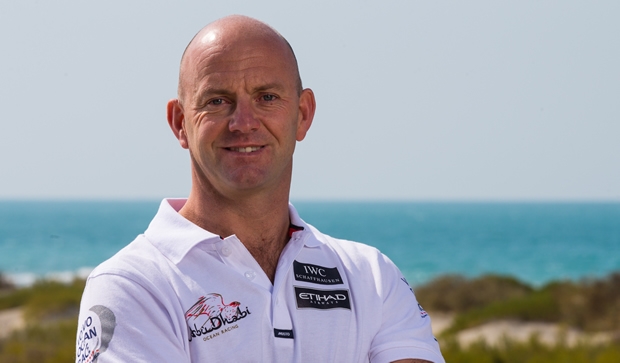
Ian Walker on the Volvo Ocean Race
Ian Walker returns for his third stab at the Volvo Ocean Race following on from Green Dragon and the first Abu Dhabi Ocean Racing campaigns. For this next race, the British double Olympic silver medallist and his business partner Jamie Boag have done a good job to secure backing once again from the Abu Dhabi Tourism & Culture Authority.
Week before last, Abu Dhabi Ocean Racing picked up its new boat from Green Marine and has since sailed it to Cascais, where their training base will be for the next three months.
Walker comes into this Volvo Ocean Race having been dealt a good hand. Along with Bouwe Bekking, he is now one of the ‘old hands’ among the skippers taking part in the race. The last ADOR VO70 was also a Farr design, as is the new VO65.
“Obviously we’ve worked Farr in the last race and you can see there’s a few ideas coming from their work with us…or not directly from us, but they’re Farr ideas or Farr traits,” Walker observes. "And the keel system is Cariboni, so we feel pretty familiar with most of it straight away. But handling-wise, it’s quite different.”
If the VO70s were robust, then the VO65 is even more so. According to Walker around 700-800kg more carbon fibre has gone into the hull alone. “Just about every component you pick up - whether it’s the steering wheel or something in the mechanical system - it’s all heavier and stronger and, therefore, I think, more reliable.”
Have just taken delivery of their new steed, Walker admitted that, yes, there are a few things they would have done differently on board, annoying little things mostly, but that was a small price to pay versus the upside of going one design.
“If you look at other one design classes, you still see quite big speed differences, but this is probably the most one design class ever, in that you can’t even bring your own sails. Anyone who’s sailed Lasers will know that there are pretty big differences between boats and their masts and sails, whereas I think these will be really identical, right down to the ropes that you use. You’d hope that the best people, who train the best, will get an edge on how they sail the boat, but I suspect we’ll all be fairly similar and maybe it will come down to decision-making and strategy and how you manage your resources over the period of a long leg.”
Despite being extremely familiar with the VO70, the Abu Dhabi Ocean Racing team will be back to school as they spend the next months learning what makes the new boat tick.
When we spoke to him, Walker was still very fresh to the VO65, but his first impression was that compared to the VO70, the new boat was more tender (due to the 65 having around two tonnes less lead in the bulb, although draft has increased by 200mm.) “The VO70 had a lot of righting moment, so you could really point and shoot, whereas this is really tippy with very balanced rudders. In the last race, I think we broached once, the whole way around the world, so that was never really too much of a concern. We’ve already broached this boat once just doing a photo shoot! So I think there is going to be quite a lot of wiping out and they are going to be more demanding…”
So if the VO65s are relatively more tender, then this could be the natural escape valve to counter teams simply pushing their boats forever harder. Equally it looks as though the crew keeping the boat under the rig in breezy conditions will take some practice and there will be more occasions when crews will have to consider saving the gear. “I think they are going to be quite demanding and we’ll be reefing pretty early,” muses Walker. “I am nervous that they are going to be really tippy downwind which can lead to sail damage if you’re not careful. So it might not be about how hard you push, but how smart you are. Principally it is sea state that causes problems, but the boats feel very strong, the rig looks very solid, so I don’t suppose there will be much holding back – not that there was a lot before…”
While the boat is shorter and will be slower upwind, the upside is that they should be a blast downwind (ie anywhere deeper than about 120deg TWA). “Once you are outside of that righting moment cone, they will be pretty quick and the angled keel pin will help with that, to get the boat out of the water. So we could still pull some pretty big mileage off the breeze.”
Crew line-up
The Abu Dhabi Ocean Racing crew is almost finalised, save for one position at the time of writing. The line-up includes many old faces from Walker’s past campaigns such as Aussie Phil Harmer (ex-Green Dragon and Groupama), Kiwi Andrew McLean (ex-Green Dragon and Camper) and Irish bow legend, Justin Slattery (News Corps, ABN AMRO One, Green Dragon, Abu Dhabi Ocean Racing).
This time the talented Simon Fisher (SiFi) comes on board in the role of navigator. “The decision to have SiFi navigating is driven by a couple of things – I get on so well with him and can have a good working relationship with him. Plus, in this race, the navigator is going to have to spend a lot more time on deck than before and SiFi is a world class helmsman and trimmer.”
The nippers are Abu Dhabi sailor Adil Khalid, who returns as the local talent after competing in the last race with Walker, while the other under-30 year old is Australian Luke Parkinson, a Aussie Olympic squad 49er sailor and part of Syd Fischer’s Ragamuffin program, where he met Walker.
So has his recruitment policy changed with the boat going one design? Walker says not, but what has had an effect is the further reduction in crew. “You still need the same number of helmsmen, but you’ve got less people, so a higher percentage need to be able to helm. You need four front line helmsmen, but ideally five or six people who can helm, and you still need two people to do bow. You need people with experience, who can fix stuff. So nothing has changed too much there, but this time you can’t afford utility people, like a strong pitman/grinder type who maybe isn’t a bowman or isn’t a helmsman, but who is just good around the boat.”
Fewer crew could also mean that the skipper and navigator will no longer be outside of the watch system. “I might have to go out on deck in this race!” quips Walker. “That will be a lot better in many regards. I think the crews are now getting so small, you are not necessarily going to have to have watch leaders, but that is something we are going to have to work out as a group.”
In practice working the cockpit Walker expects will be largely the same. “There are no loose luffed spinnakers, but there weren’t in the last race really, so you’re not going to have a lot of trimming downwind when you still need four on deck and upwind you need three – mainsheet trimmer, helmsman and a grinder. Upwind you can probably get away without a jib trimmer in a lot of conditions, but not always.”
On the VO70 sail changes were done with eight so you could leave a couple of crew below, but this time it will be all hands on deck.
A new role within the Abu Dhabi team is that of ‘Performance Manager’, ably filled by Neal McDonald. Walker explains: “When we reviewed the last race, one of the things we felt would have benefitted us, particularly when things weren’t going well, was having a ‘coach’ for want of a better description - somebody who works very closely with the sailing team, who isn’t actually on the boat, but is someone you can run ideas past. Certainly I have always taken on too much in these programs in the past, so having Neal is a great way of freeing up some time for me, because it is going to be more demanding in this race with fewer crew. And if I need to not sail for some reason, he can jump on and sail, or if SiFi needs a hand on data analysis, he can jump in and do that and he’ll be able to work with Luke on his steering technique, etc. Neal is the perfect choice for that and it is a real win for our team to have him on our side.”
Walker says that they may get other coaches in on a temporary basis as and when they are required.
In addition, Abu Dhabi Ocean Racing has a six strong shore team, led by Shore Manager Guy Barron, and about the same number working on the logistics and commercial sides. Walker reckons this is around half the number they had in the last race. To us, this sounds like a lot for a race where the boats are one design, however Walker points out that in the build-up to the race, they have to operate autonomously: “It is probably the same number of people that Rán or any top program might take to the Maxi Worlds. That is what we are comparing to it now.”
Once teams arrive in Alicante and begin the race proper, then they can make use of Volvo’s new ‘shared services’, which will exclusively handle the servicing and maintenance of the VO65 fleet. But an outstanding question remains over what ‘shared services’ and individual teams will carry in terms of spares. Walker cites an example: “They might have two spare masts, which is great, but what happens if three boats breaks masts or if one mast is in Alicante and one is in Auckland and two boats lose rigs before the start?”
As they have to look after themselves in the months building up to the race, teams will have to have their own spares and, Walker observes, if teams have already bought the necessary spares – then why will they need ‘shared services’ during the race? “Depending on how much you can afford and how much risk you want to minimise, you could buy a whole spare boat, but we can’t afford to do that.And then teams have got different ideas about what spares they want to carry. But Nick Bice is doing a good job and now that there are some teams, this is all being discussed…”
Also, according to Walker, there is almost no limit to what gear can be replaced on the boats, so for example they could change to new daggerboards prior to the start, provided, of course, they are one design boards, certified by Volvo.
Looking ahead
From here the program for Abu Ahabi Ocean Racing is to spend three months in Cascais where they will be operating three weeks on, one week off. Thanks to the one design, carrying out any sort of modifications to the boat being strictly verboten, so what the team will be up to during this period will obviously be very different to the equivalent stage prior to the last race with the box rule VO70s.
“I looked at some job lists form the last race a month into Cascais and I think 90% of the jobs on the job list couldn’t be on the job list this time, because you wouldn’t be able to do them – all modifications and ideas and things to trial, etc,” says Walker. “We have a sailmaker, but I am not even sure we’re going to take the sails off the boat from one day to the next, although you’d be amazed how much time sailmakers spend making bags! We have already destroyed two bags! So it is a different mentality. Before it might have been ‘right - we’re into a recut’ and we’d be working all night so that we can go out and test it the next day. Those days are gone.”
In addition, for this Volvo Ocean Race, in-port racing doesn’t count towards the overall points score, although it will be used to split ties. “So we are not going to spend days working on our inshore boat handling which we might have had to do.”
The competition
As to the form of the fleet this time, this has yet to fully define itself. Walker cites Team SCA which has been training for a year and a half, the all-female crew also permitted to race with three extra crew: “The first challenge will be to try and make sure that we try and catch up with how much they have learned with the boat. And Bouwe [Bekking, skipper of Brunel] is going to be strong.
“Charles Caudrelier [skipper of Dongfeng] was probably one of the strongest people on Groupama and I’m sure they will be good. They will have their own challenges if they are taking four Chinese guys, but they are sounding very positive about it. The US team – it is easy to say ‘young American team - they won’t be any good’, but I remember when I was in my late 20s, I would have fancied my chances, especially in a one design!
“In fact, the barriers to performance of being young or female or underfunded or late – all the things that have undermined programs before – they are not there anymore. I think what will happen is that everyone will have their day. Even if a team is slightly weaker, I can see them getting opportunities.
“I think back to Green Dragon when we were WAY off the pace, sometimes two knots slower. It was amazing how often we were in the top three in races – I’m not saying we were geniuses, I’m saying that opportunities open up, or you are more prepared to take risks when you are at the back and that can propel you to the front.” The best example of this being Brunel Sunergy from the 1997-8 race.
While there are inevitably a few teething problems with the logistics of how to run the one design, Walker says he remains the biggest supporter of the change, not surprisingly since some of his greatest success has been in this style of racing. “To start with I was probably the only one in favour [of going one design], but slowly everyone came around. Equally, with my business head on, I knew that if it wasn’t going to be one design, there was no way we were going to raise the money for it. So I am a big supporter, but now we are entering an interesting phase – how do we manage modifying the boats? Some teams want to modify some things and some don’t and that is going to take a lot of managing and a lot of paperwork for James Dadd.”
Most of these changes are minutae, like lopping off the end of overly long sheets, or the location of non-skid or use of elastic to hold things in certain positions, although there are more major issues like re-working the plumbing for the ballast tanks. To make such changes it is necessary to get the agreement of at least three teams, before the request is passed on to VO65 Class Manager James Dadd and his committee, who are the ultimate arbitrators of amendments to the VO65 rule.
“We want the class to be managed tightly - the last thing we want is this race going on and then someone saying that ‘they did this’ or ‘they did that’ and ‘this boat is faster than that boat’. Unless it is us winning of course!” concludes Walker.
After their training in Cascais, Abu Dhabi Ocean Race will complete a transatlantic passage before returning to the UK for Aberdeen Asset Management Cowes Week and competing in the RORC’s Sevenstar Round Britain and Ireland Race, starting on 10 August, before heading south for the start of the Volvo Ocean Race proper.

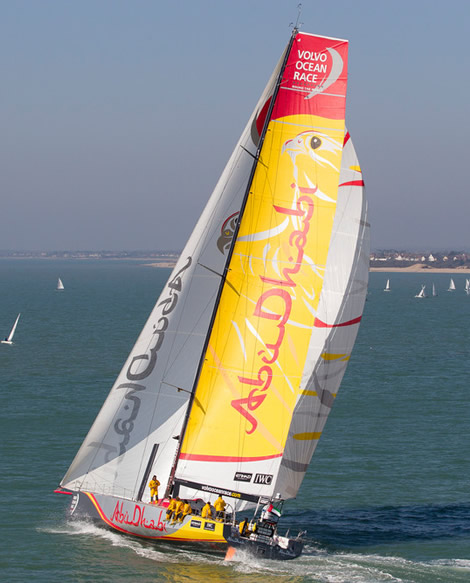
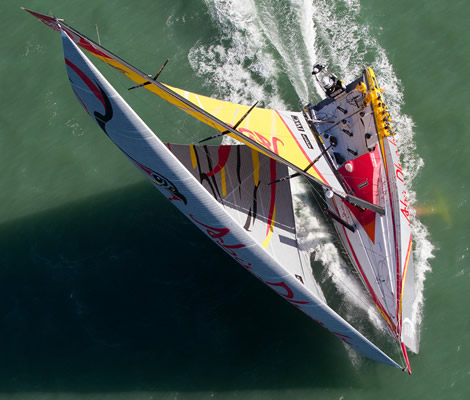
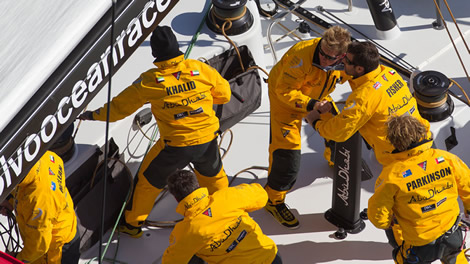
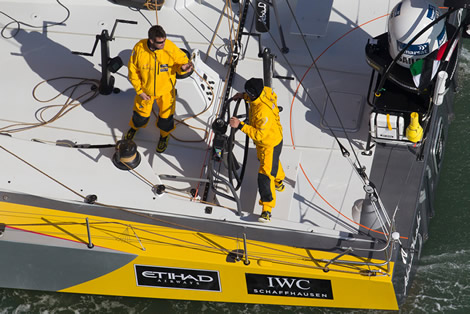
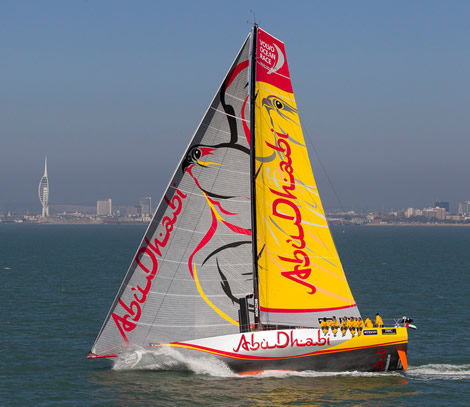
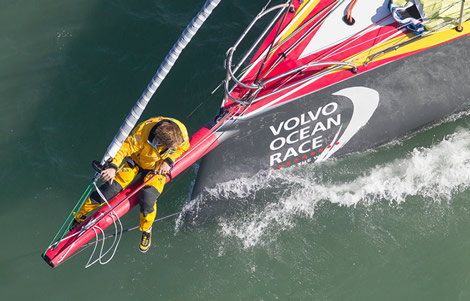
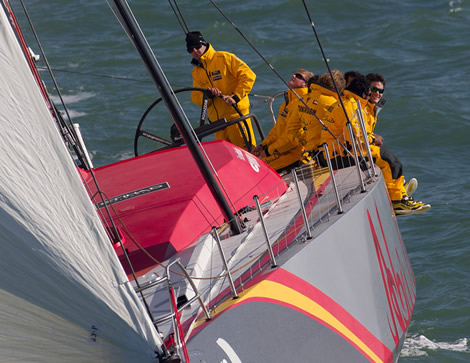
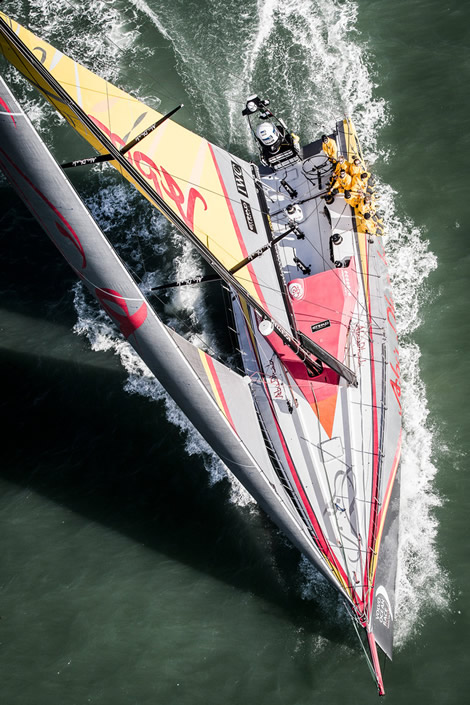
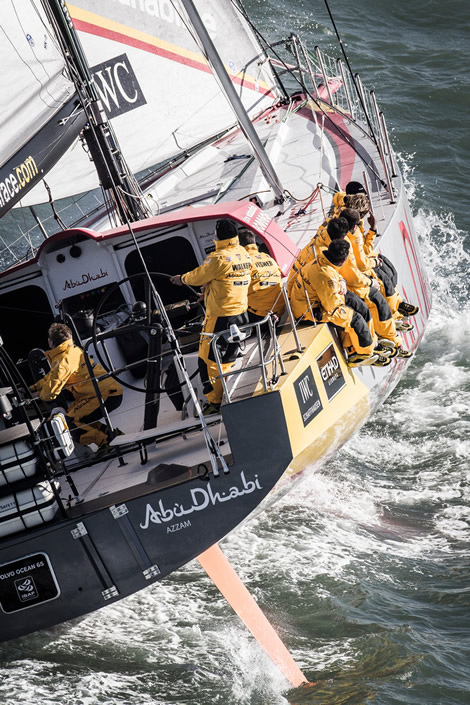









Latest Comments
Add a comment - Members log in